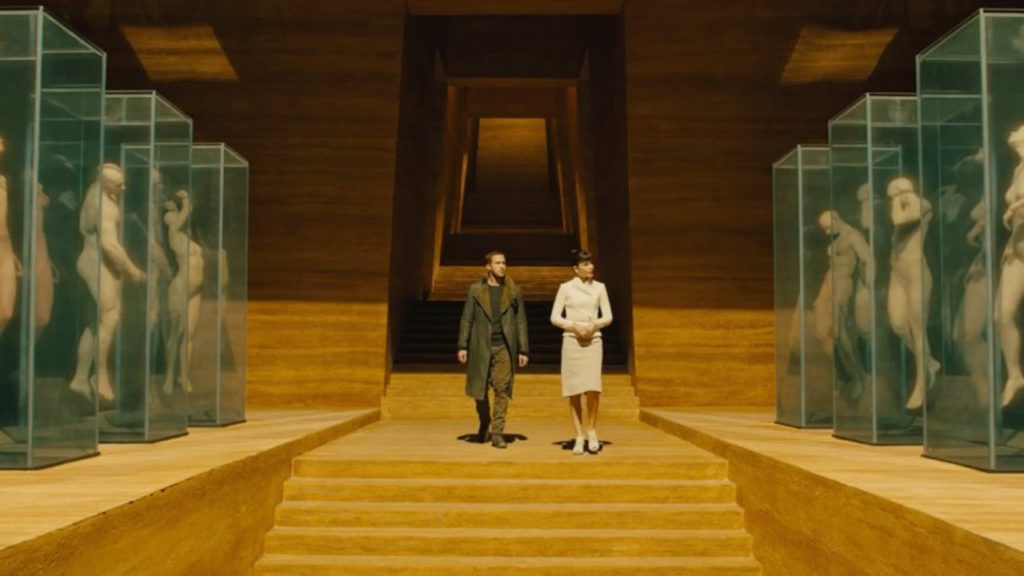Note: This piece contains heavy spoilers for Blade Runner 2049. If for some reason you’ve managed not to see it yet, please hold off on reading this until you have. Trust me. It’s worth it.
Hi, my name is Kara Dennison, and I’m once again the last person on the planet to see a Very Important Movie.
Blade Runner 2049 wasn’t on my Don’t Watch List by any means; it was just a matter of finding time to watch it and concentrate on everything it threw at me. Because, let’s be real, we all knew this was going to be a big one if they did it right.
There was a lot to take in, both as a viewer of the original movie and as a fan of science fiction in general.
But what jumped out at me early on was the diagnosis of one of the missing or fake Replicant-born children: “Galatians Syndrome.” And the big reason this jumped out at me is because Galatians Syndrome isn’t a thing.
Now, before you get ahead of me – no, this isn’t me taking down a science fiction film for making up a medical issue. Far from it. What grabbed me is what Galatians already is… or, rather, who they were… and what message the film was sending us extremely early on about Agent K’s journey.

Paul the Apostle
For those who didn’t spend their formative years in church or in a parochial school, it’s time for a bit of Bible study. And for those who aren’t Christian, or aren’t religious at all, this isn’t the Bible as fact or history: it’s the Bible as literature. Any culture’s beliefs are equally open for use as symbolism in fiction, and there’s a lot to gain from reading as many books of as many faiths as possible to take all of that in.
For those who don’t have that kind of time, we’ll zoom right to the man of the hour: St. Paul the Apostle.
Around the early 30s AD, Saul of Tarsus had devoted himself to persecuting and arresting the early disciples of Jesus. According to his account in Acts of the Apostles, Jesus appeared to him on the road to Damascus, striking him blind for three days. After having his sight restored by Anais of Damascus, Saul converted, changing his name to Paul, and began preaching that Jesus was the son of God.
A good chunk of the New Testament is made up of Paul’s letters to early churches finding their feet at a time when, well, Christianity really wasn’t a standardized or particularly popular thing. While some elements of his letters seem to apply only to very specific norms of the time, much of what he wrote still applies.
One of Paul’s most formative letters was to the people of Galatia, a settlement of Celtic immigrants in what is now part of Turkey.
The Galatians wanted to set up a church. But there was one problem: worshippers of Jesus were by and large Jewish, and the idea of Gentiles accepting Jesus as the son of God was still kind of a new and hinky thing. They weren’t sure what to do. Could they be Christian if they weren’t of the Chosen People?
Paul insisted that yes, they could. Moreover, contrary to what the Galatians had been told by others, they were not obligated to follow Jewish law in order to do so – and anyone who told them to was leading them down the wrong path entirely.

Dr. Stelline: The Chosen One
A good portion of Blade Runner 2049 is a red herring, and one we probably should have seen simply because it was so obvious. Agent K’s journey from Replicant to human, once he believes he’s the missing Replicant baby, is a powerful one. But hidden away from prying eyes – and from the audience – is Dr. Ana Stelline, the answer to the whole puzzle.
According to the papers Agent K finds, Dr. Stelline (as we later piece together) is the one diagnosed with Galatians Syndrome. And given her existence in a walled-off room, we can likely assume that the fictional syndrome has something to do with a compromised immune system.
Maybe.
We’re never really given any depth of explanation, but we can assume all day. Would the offspring of a human and a Replicant naturally have a compromised immune system? It’s possible. There’s a lot we don’t know. Though it’s equally likely that Dr. Stelline is largely fine health-wise, and was simply “stored away” for safekeeping. We don’t know.
However, we as viewers can absolutely take something away from the script’s invoking of the Galatians. And it’s probably not some hidden knowledge that Zero Century Celts had immunodeficiency.

Agent K: “Born, Not Made”
Agent K is, all things considered, an average Replicant of Wallace’s new design. We are led to believe for a short time that he isn’t – that he’s something “more” and “different” genetically. His Joi even invokes the Nicene Creed’s words about Jesus – “born, not made” – when she hears what the two believe to be the truth about him.
But K’s journey is a strange one. As he learns of his human background, he attains humanity, even failing a Baseline Test over it. But we later find that there is nothing different about him, and that his human behaviors (his soul?) came to the surface once he was given license to believe he was.
In K, we see the same conundrum as the early Galatians:
Someone who believes they can only be one of the truly special provided they suit it down to the ground. Provided they are that in every way, from the beginning – in K’s case, having real childhood memories and being born. Between Baseline Tests and the failsafe nature of Wallace Replicants in general, it’s clear that precautions are in place everywhere to make sure that’s what all Replicants believe.
Phrased like that, K almost seems to be the one who suffers a sort of “Galatians Syndrome,” if we present it as psychological rather than physical. In the end, he finds his humanity even with the knowledge that Ana, not he, is the miraculous missing child. At least, he seems to in the brief moments he has left.
And here’s where the real question of the movie lies.
K, a Replicant of a line made specifically not to run, finds his humanity when he is given the scope to contemplate it. As soon as he’s allowed a little shred of proof that he might be something else, he latches on. And with Ana, every Replicant will be able to have that shred of proof. And they won’t have to have a Messianic breakdown to get there.
Perhaps, then, we aren’t being asked to see Ana as someone with this mysterious Galatians Syndrome… but, rather, as someone who will serve to cure its inherent presence in Replicants everywhere.
What this means for the future of the Blade Runner franchise – if anything – is unclear. 2049 seems to put an end to the discussion: under the right circumstances, no Replicant can truly be stopped from finding their inherent humanity. They just need someone to prove to them that there are no prerequisites or entrance exams.


2 Comments
I was late to the Blade Runner 2049 party also! I loved it – it left me haunted much the same way the original did. I have a question – or maybe an observation that is causing me a great conundrum. Dr. Ana tells K that she is not allowed to use “real memories”. If that’s the case why did K have/share her memories? That makes me wonder if he is in all actuality the “dead” twin. Thoughts?
Dr. Ana says “It’s illegal to use real memories, officer.” Basically, “I wouldn’t tell you if I did”.